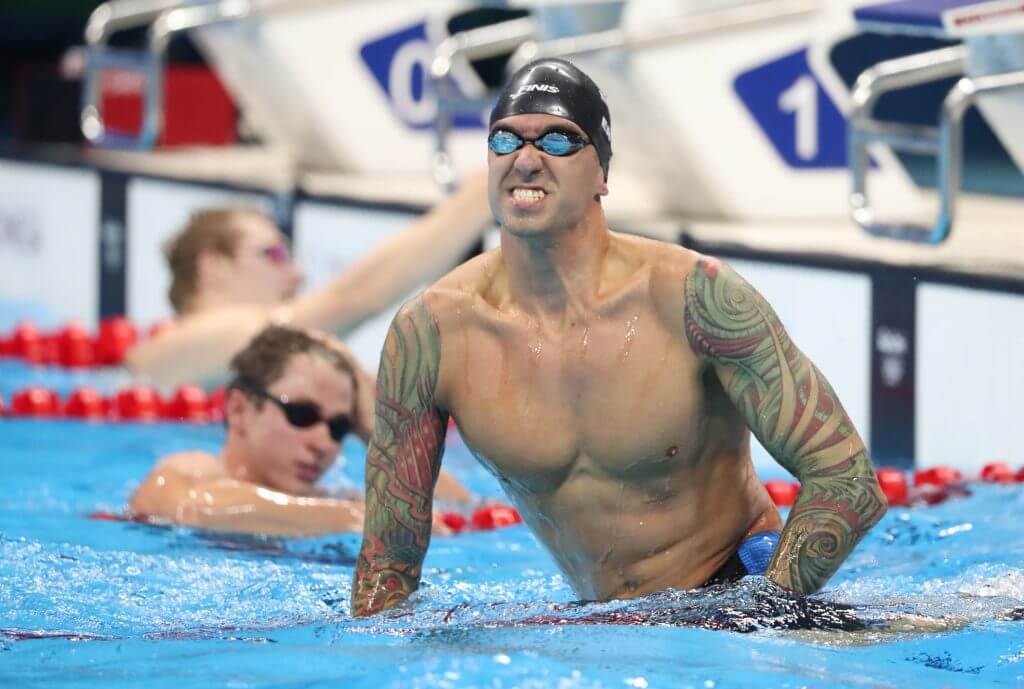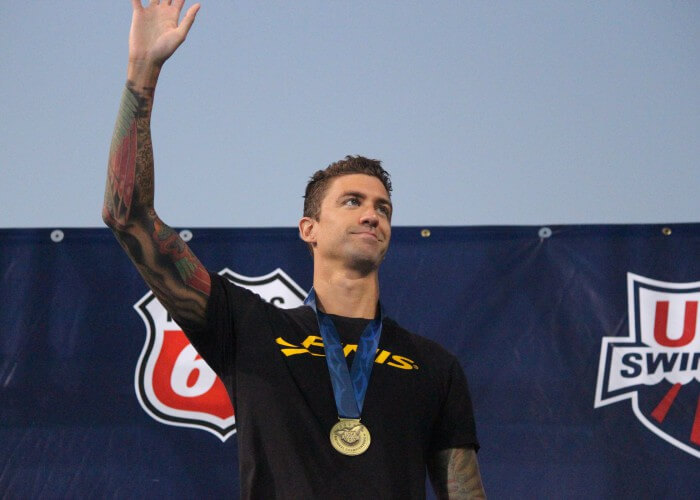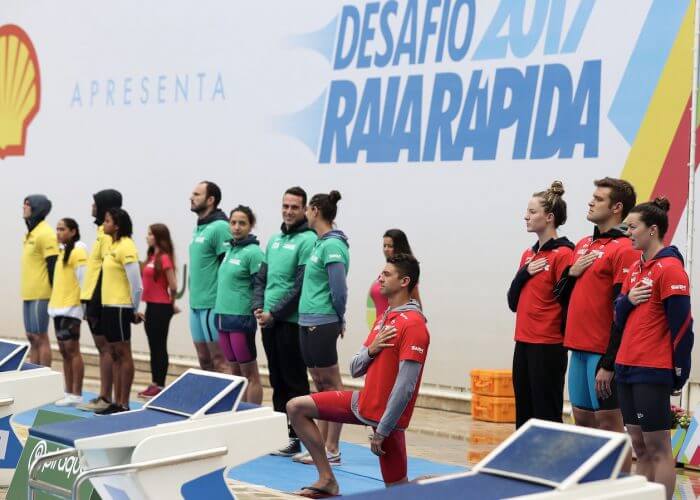Anthony Ervin on Olympic Rule 50: ‘That’s Not Going to Fly’

Editorial content for the 2021 Tokyo Olympic Games coverage is sponsored by GMX7.
See full event coverage. Follow GMX7 on Instagram at @GMX7training #gmx7

Conversations about athletes’ roles in protesting systemic racial inequality and police brutality have been reignited this week by the shooting of Jacob Blake in Kenosha, Wisc. Players in the NBA, WNBA, MLS, MLB, plus tennis player Naomi Osaka and other athletes refused to take the field this week. The athletes’ strike furthers a conversation that was accelerated by the killing of George Floyd, an unarmed black man, by Minneapolis police in late May. After the killing of Floyd, Swimming World spoke to Anthony Ervin, the first African-American swimmer to win an Olympic gold medal, for his thoughts on athlete protests back in June.
Anthony Ervin has visited the top step of the Olympic podium often enough to understand how sacred a place it can be. The gold medalist in the men’s 50 free in 2000 and 2016, two very different versions of the cerebral Ervin rose to that hallowed place. If he gets the chance to mount the top step again at the 2021 Olympics, he can’t say a year out what will be in his heart and his mind then.
It’s why Ervin sees the International Olympic Committee’s broad prohibition against protests and demonstrations on the podium, codified as Rule 50 in the Olympic Charter, as so out of step with the reality of sports’ place in the world.
“What is going to be in a person’s heart? And are you going to be allowed to do it?,” Ervin told Swimming World this week. “I’ve stood on the podium singing the Star-Spangled Banner as loud as I could. And I don’t sing very well, so it was probably a little off-key, to the cringing of maybe some ears nearby. But I was proud, and that was in my heart.
“Who knows what’s going to be in somebody’s heart? I don’t get to tell anybody what’s in their heart in that moment, when they get to reflect on how they got there and the country they come from. I feel like Rule 50 is a repudiation of that, a denial of what’s in your heart.”

Anthony Ervin Photo Courtesy: Griffin Scott
As athletes have become increasingly vocal on issues that the IOC would broadly define as “political” – particularly ongoing protests in America over systemic inequality, institutional racism and police violence – Rule 50 sounds increasingly outdated. For many athletes, an Olympic podium is the most visible platform they’ll ever have. Thus, a movement is underway to get the IOC to reconsider its stance.
Rule 50 is a gilded cage of a directive. Its preamble states that “the IOC Athletes’ Commission and the IOC are fully supportive of freedom of expression,” before setting the guideposts between which athletes are expressly barred from expressing themselves.
Rule 50 of the Olympic Charter provides a framework to protect the neutrality of sport and the Olympic Games. It states that, “No kind of demonstration or political, religious or racial propaganda is permitted in any Olympic sites, venues or other areas.”
It restricts protests and demonstrations from the field of play, the Olympic Village, and during all official ceremonies (Opening, Closing, medal). The rule exists in a world governed by “a fundamental principle that sport is neutral and must be separate from political, religious or any other type of interference,” a world that differs sharply from reality. Among the actions that constitute impermissible protest are “displaying any political messaging, including signs or armbands; gestures of a political nature, like a hand gesture of kneeling; refusal to follow the Ceremonies protocol.”
Rule 50 does allow (or rather, fails to prevent) athletes to express themselves with the media, at team meetings and in digital or social media platforms.
It’s no wonder that the restrictions are under particular assault in the current moment. For Ervin, a representative on behalf of USA Swimming to the U.S. Olympic and Paralympic Athletes’ Advisory Council, the constraint on personal freedom is a big issue.
“For me, it boils down to two things,” he said. “How are you attempting to control someone’s body? The podium is a place for you to commune with your country. Is that political or not? I don’t know.”
Recent protests have hit Anthony Ervin hard. The first black American swimmer to win an individual gold medal, he turned 39 on May 26, a day after George Floyd was killed by Minneapolis police, what Ervin unflinchingly calls “a lynching”. Ervin watched the video, of Derek Chauvin pressing his knee on Floyd’s neck for 8 minutes, 46 seconds until and after his life ended, for the first time on his birthday.
“Just sadness. And coldness and numbness,” Ervin said. “And a powerlessness, that this had happened again. And then later came the anger and the rage.”

Anthony Ervin kneels during the national anthem at a race in 2017
Ervin was also affected by video of the murder of Ahmaud Arbery. Ervin had been training at the University of Michigan with Mike Bottom before pools were closed in March by the COVID-19 pandemic. He relocated for quarantine to Canada, where his fiancée and their young daughter live in Ontario. Without a pool, Ervin has stayed in shape by taking runs through his neighborhood.
Seeing Arbery, a 25-year-old black man, targeted and shot by two white men in Brunswick, Georgia, on Feb. 23 while jogging, was chilling.
“This guy goes out for a jog and to just be accosted and murdered, for what?,” Ervin said. “What is it that you’re trying to pony up as an excuse for murdering somebody? I go for a run every day. Is life really that much of a minefield? The decision is clear to me that it’s racism that led to that.”
Athlete activism, like police brutality and racial injustice, isn’t a new conversation, even if recent news has provided a recent surge. John Carlos and Tommie Smith endured fallout from their famous raised-fist protest on the podium of the men’s 200-meter dash at the 1968 Olympic Games in Mexico City, which got them expelled from the Athletes Village and vilified in the media. Both have written about that experience and become forerunners of the athlete activism that is now commonplace.
“In trying to stand up for human rights, for the equality of all people, they were condemned and cast aside for decades, until through the arc of time and history – and I’m sure a lot of people knew at the time they were right, absolutely – but it became consensus decades later that they had done the right thing,” Ervin said. “And yet, they were punished for a good part of their life for taking a stand in that way. Now, we’re seeing something very similar.”
More recently, Colin Kaepernick’s kneeling protest during the national anthem has led to new awareness. Megan Rapinoe of the U.S. women’s national soccer team, who could be in Tokyo next summer, also took a knee during the national anthem in 2016. Ervin himself knelt during the national anthem at a meet in 2017. American fencer Race Imbolden and hammer-thrower Gwen Berry were each placed on one-year probation for medal-stand protests (kneeling and fist-raising, respectively) at the 2019 Pan Am Games.
The current moment has brought Rule 50 back into the sights. Global Athlete, an international coalition of athletes, has urged the IOC to abolish Rule 50. Group of Athletes in Ireland, Canada, Germany and the United States have backed alternatives from repeal to overhaul.
Anthony Ervin is hopeful that progress will be made while being sympathetic to the IOC’s aim. The Olympic movement is founded on high ideals and has to mollify a lot of stakeholders, but the reality often falls short of those aspirations. He’s seen how other nations have launched protests similar to America’s, and the cultural interconnectedness of the world makes Rule 50 particularly against the tide.
“The world is a little too interconnected to think that that’s going to fly,” Ervin said. “So they’ve got to sort something out, because if their stance is, ‘you can say and do whatever you want anywhere, just not there,’ well, that’s the one place where it’s going to have the most impact.”





Miguel Santos says CAL BEARS!
A rule that would accomplish the opposite of it’s intention.
John Carlos and Tommie Smith made their statements. It was awesome and inspiring. Speak the truth to power.
The truth shall set you free.
Well I guess consistent with Rule 50 no flags, no anthem, no sweats/warm up suits with country I.d.